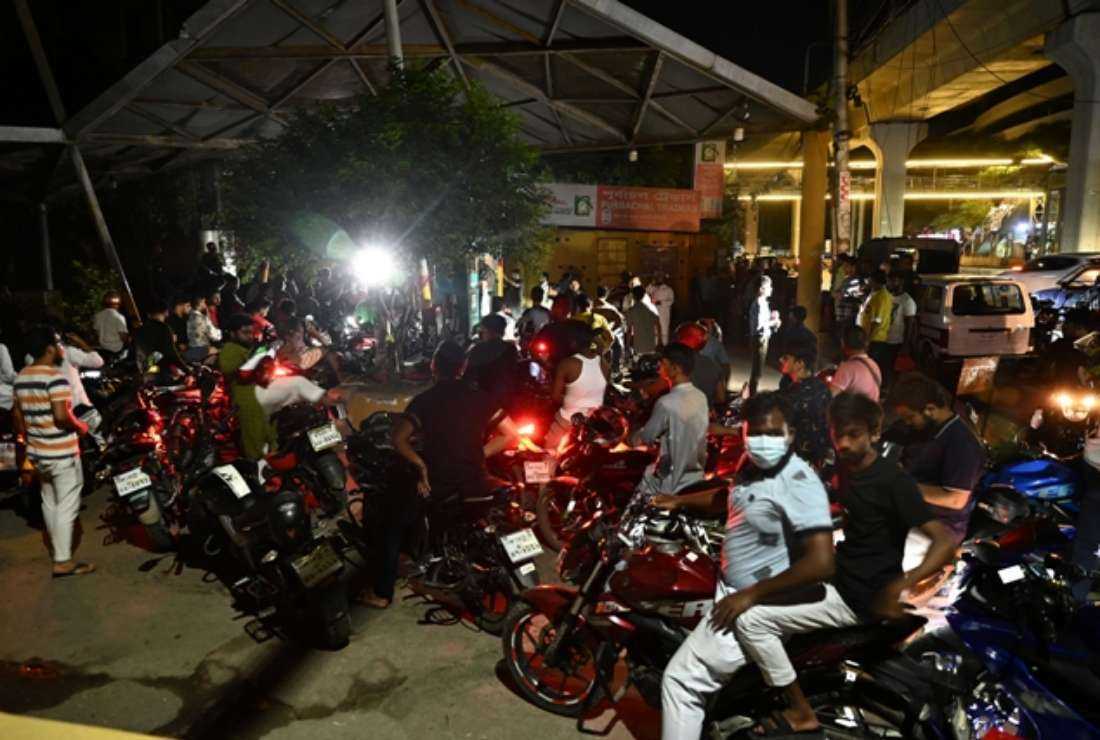
People queue at a gas station after the government increased fuel oil prices in Bangladesh, in the capital Dhaka on Aug. 5. (Photo: AFP)
Christians like the rest of the people in Bangladesh are wary of a growing financial crisis in the South Asian nation in the wake of a hike in fuel prices by more than 50 percent in just a week.
Suman Mondal, a Baptist Christian who runs a roadside tea stall in the capital Dhaka, says he’s worried he may have to return to his home village.
The steep increases in fuel prices since the first week of August have left 38-year-old Mondal struggling to meet even the basic expenses of his family including his old parents, wife, and two children
He is the only earning member of the family that lives in a rented house in the Mirpur area. “There is a lot of uncertainly in our lives,” Mondal says.
“Prices of rice, sugar, soybean oil, kerosene, and every other essential item have skyrocketed as a result of higher fuel prices. Even bus fares have suddenly increased,” Mondal told UCA News.
His expenses for running the small tea stall now far exceed his earnings, he added in despair.
“It seems impossible to survive. We did not suffer so much even during the Covid-19 pandemic"
“On the one hand prices have increased and on the other customers have decreased. People are not spending anymore. My business is running at a loss, life has become difficult,” Mondal said.
Before the crisis hit, Mondal used to make a daily net profit of around 300 taka (US$ 3.13). He now spends his days worrying about paying the rent and his elder son’s school fees.
“It seems impossible to survive. We did not suffer so much even during the Covid-19 pandemic,” he said.
Countless others in the nation of more than 168 million people are facing a similar predicament.
Christians, who make up just about 0.5 percent of Bangladesh’s population, are feeling anxious too as the majority of them are poor and even in normal times struggle to survive.
There have been sporadic protests at gas stations across the country calling for fuel price rises to be reversed, reminiscent of crisis-hit Sri Lanka.
Anik Mallick, 32, who use to earn an average of 18,000 taka (US$188) a month by ferrying people on his motorbike through the notoriously crowded streets of Dhaka too is left high and dry due to the fuel hike.
"The people of Bangladesh are in no position to sustain themselves through this crisis"
“Last week, I could only earn 300 taka,” he told UCA News.
Mallick, who is an economics graduate and the eldest among three siblings, has been on the lookout for a decent paying job for a long time.
“Now with the economy down, that hope has also been lost. I don't know what to do,” he said.
The price of fuel has never gone up by 52 percent in such a short time since Bangladesh’s independence in 1971, energy experts say. The impact on the common man will be devastating, they add.
Anu Mohammad, a former professor of economics at Jahangirnagar University, said: “Prices have been increasing for some time now, and will keep on increasing. The people of Bangladesh are in no position to sustain themselves through this crisis.”
A senior priest who is secretary of a diocesan justice and peace commission said a majority of the poor were facing starvation and blamed the government’s lack of foresight for the crisis.
“The government undertook one big project after another with loans from abroad without bothering about the situation on the ground. It has no other alternative now but to bring the prices of essentials under control,” said the priest who did not to be named.
Common people like Mondal and Mallick blame the government for the rapidly deteriorating economic situation, which the government denies and maintains Bangladesh is in a better position than most other countries in the region.
Foreign Minister A. K. Abdul Momen says that the people of the nation “are living in heaven” in comparison to other countries during this time of global recession.
Bangladesh will not go the Sri Lanka way, he said.
A certain group is spreading panic with a “baseless” claim that Bangladesh will see a situation like crisis-hit Sri Lanka, the foreign minister said while adding that the country has enough dollar reserves and is just maintaining a bit of austerity while bearing in mind future crises.
The minister's comments sparked a heavy backlash on social media with many slamming him for being "insensitive" and mocking the plight of people.
Momen later clarified his statement and claimed that his use of the word “heaven” was not in its “true sense.”
He said that the meaning of his comments has been "twisted" as he meant that the people of Bangladesh are in a far better situation compared to other countries.


